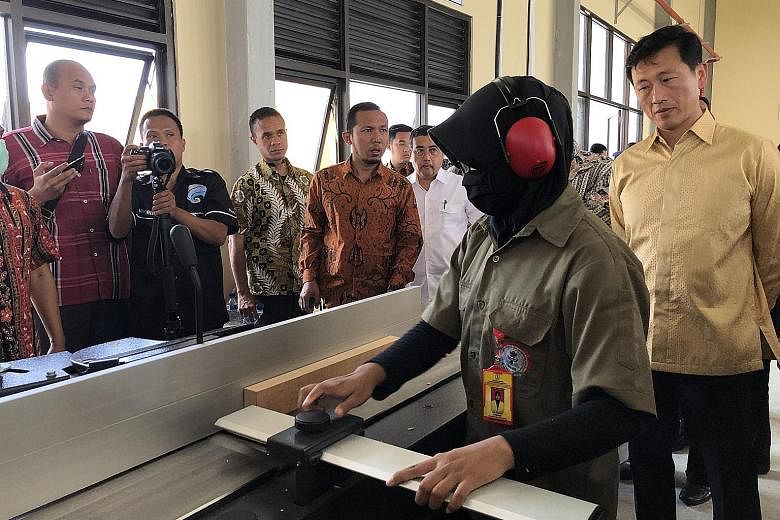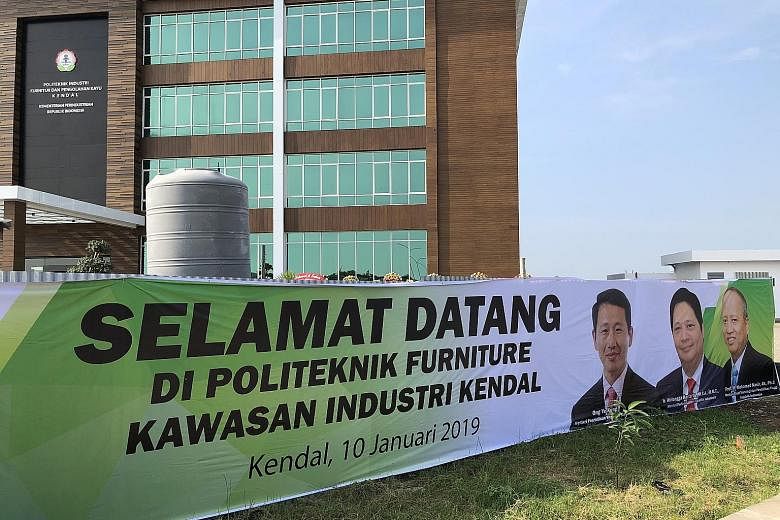Singapore and Indonesia are keen to explore further collaboration in vocational education, their ministers said yesterday.
Singapore's Education Minister Ong Ye Kung noted that Indonesia's economy has been on an encouraging trajectory and that the current administration is determined to push for industrialisation and job creation.
"To do so, they must have the right policies, attract investments from all over the world and, at the same time, recognise that to attract investments and make sure these translate into jobs, they must have training," Mr Ong told Singapore media as he wrapped up his three-day visit to Indonesia.
"So the setting up of polytechnics across the whole archipelago has always been one of the top priorities of this administration and of MOI (Indonesia's Ministry of Industry.)"
Earlier in the day, he attended the opening ceremony for one of Indonesia's newest polytechnics, the Kendal Furniture and Wood Processing Industry Polytechnic, where Indonesia's Industry Minister Airlangga Hartarto said in a speech that the government is committed to building more polytechnics.
"Jokowi tells us 10 polytechnics are not enough… Can we make it 100?" Mr Airlangga said, referring to Indonesian President Joko Widodo by his popular moniker.
"Minister Ong has a lot of experience in developing people and we would like to learn from Singapore how to increase the capability and the competency of our labour force as well as human resources."
Mr Ong told reporters later that when he hosted Mr Airlangga at Nanyang Polytechnic last year, the Indonesian minister had been eager to get a better understanding of Singapore's polytechnics and SkillsFuture initiative.
"Since then, we've been discussing how to deepen this collaboration," added Mr Ong.
Singapore has worked with Indonesian polytechnics namely on "train the trainer" programmes. ITE Education Services, for instance, has worked with MOI to train about 100 trainers and leaders in Indonesia's polytechnics so far. But the country is open to exploring other ways of working together, said Mr Ong.
"Most importantly, so long as the government here is committed, has a national plan, is prepared to support the programme, as Singapore has done through SkillsFuture, then you know there's a long-term plan and I think we can then work together beyond 'train the trainers'," he said.
"We can look at whether we can do curriculum development together, even deliver some modules here."
This has been done in countries such as Myanmar and India, and can be considered in the case of Indonesia, he added.
At the polytechnic, Mr Ong had the chance to speak to students and observe them at work. He also witnessed the signing of an agreement between Singapore Polytechnic and the MOI to deepen cooperation in human resource education and training related to Industry 4.0.
Polytechnics are an important way to build up more training opportunities, supporting Indonesia in its push to embrace Industry 4.0 and create jobs, he told reporters there.
The polytechnic, located in Kendal Industrial Park, a joint venture between Singapore's Sembcorp Development and Indonesia's industrial estate developer PT Jababeka, was first announced at the Singapore-Indonesia Leaders' Retreat in 2017. It welcomed its first batch of students last October; just 99 were picked from 694 applicants, and they already have jobs in 16 furniture companies waiting for them.
Mr Airlangga held up Kendal Industrial Park, a 2,700ha park in the bustling port city of Semarang, as a "success story", adding that he hoped it could be replicated in other areas around Indonesia.
The park was officially opened by President Joko and Singapore Prime Minister Lee Hsien Loong at a Leaders' Retreat in 2016. Since then, it has continued to make progress, with 48 companies committed and with US$500 million (S$676 million) in investments.
Sembcorp in 2016 said that about 100,000 jobs are expected to be created by 2021, when the first phase of the project is complete.
Noting how the park was just "an empty piece of land" some years ago, Mr Airlangga said: "If Indonesia and Singapore can work closer, then what we would like to achieve together can happen at the speed of light."


